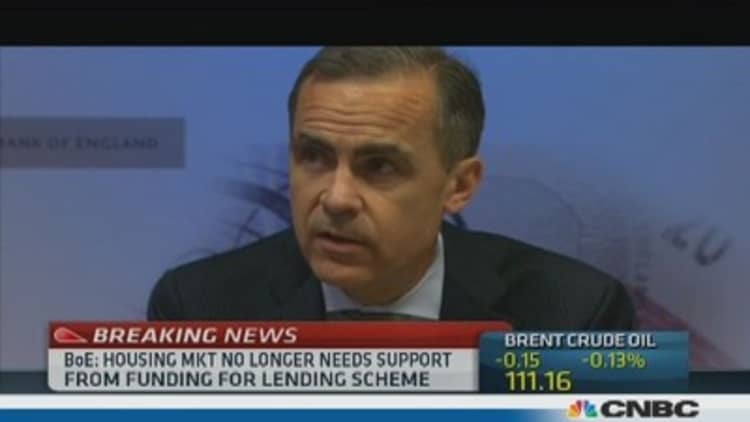
The Bank of England's surprise announcement that it would stop one method of housing market stimulus is one of the first tentative steps towards tightening monetary policy.
The halting of the Funding for Lending (FLS) scheme for household lending, announced on Thursday, seemed out of step with the U.K. government's plans to stimulate the housing market via the Help to Buy scheme – and repeated statements from the government and Bank of England Governor Mark Carney that the U.K. is not undergoing a housing bubble.
It marks one of the biggest changes in policy direction by Carney since he took over from Mervyn King earlier this year.
The announcement is "not an admission of a bubble, but more a sharp admonition to banks about lax standards on mortgage lending," according to Marc Ostwald, strategist at Monument Securities.
"This is actually the line of attack on financial sector reform I have been expecting from Carney ever since he was appointed."
(Read more: BoE scales back lending scheme)
U.K. house prices hit a record level in October, according to the Office for National Statistics, and are up by 3.8 percent in the year to August 2013. However, this was mainly fueled by growth in London and the South East – when they are excluded from figures, prices rose by just 2.1 percent.
There have also been concerns that the Help to Buy scheme, aimed at supporting borrowers with low deposits, which will be expanded next year, could help stimulate a bubble.
Carney told reporters that he is happy to take more drastic action to dampen house prices if needed. The governor has also introduced requirements for lenders to verify borrowers' income – and said it was difficult to believe that they hadn't been introduced before.
(Read more: Bubble trouble in the UK?)
"Although the changes to the FLS may be a surprise, they are not a shock," Paul Smee, director general of the Council of Mortgage Lenders, the mortgage lenders' trade body, said.
"Mortgage lenders are well equipped to meet their funding needs, as wholesale funding market conditions have improved and retail deposits are robust."
A letter to Chancellor of the Exchequer George Osborne from Carney, made public by the Bank of England, is careful to stress that the government and Bank are working together. It registers that "house price inflation appears to be gaining momentum" and points out that Help to Buy is meant to deal specifically with "access to mortgages for borrowers without large deposits" rather than broader household lending.
Osborne said in a statement: "The Funding for Lending Scheme proved to be a successful tool in supporting the recovery. Now that the housing market is starting to pick up, it is right that we focus the scheme's firepower on small businesses."
"The BoE may be underestimating the pace of economic recovery, which could warrant tighter policy sooner than anticipated," Christopher Vecchio, currency analyst at DailyFX, said.
Unemployment has fallen faster than anticipated by the Bank, with analysts now forecasting that it will hit the target of 7 percent at which Carney said he would consider raising interest rates as early as the end of 2014, rather than in mid-2015 as the Bank believes.
(Read more: Is it getting tougher to work around Europe?)
Businesses should be able to borrow at cheaper rates from the extension of the scheme, as the fees for drawing from it will be set at 25 basis points, the bottom of the previous scale.
Banks who lend to companies under the scheme can offset any increase in their minimum capital requirements, which should remove any worries that new lending may hurt capital ratios ahead of tough new rules on how much capital banks should hold.
The pound rallied following the news, while the FTSE 100, the main U.K. stock market index, was flat in thin trading.


